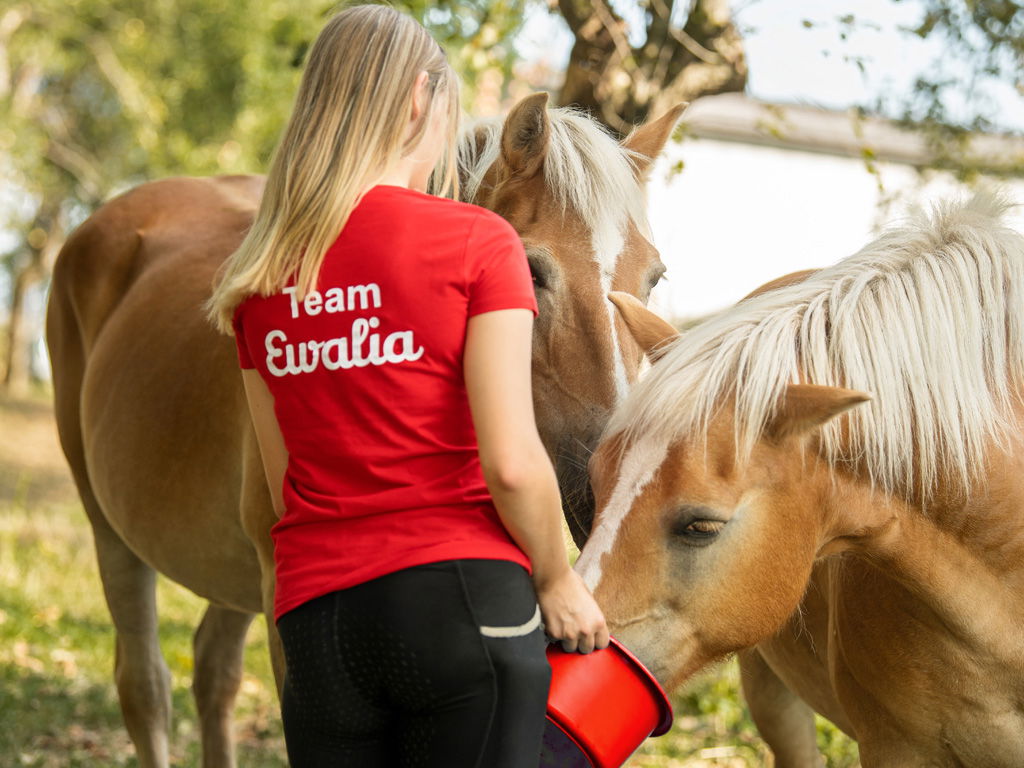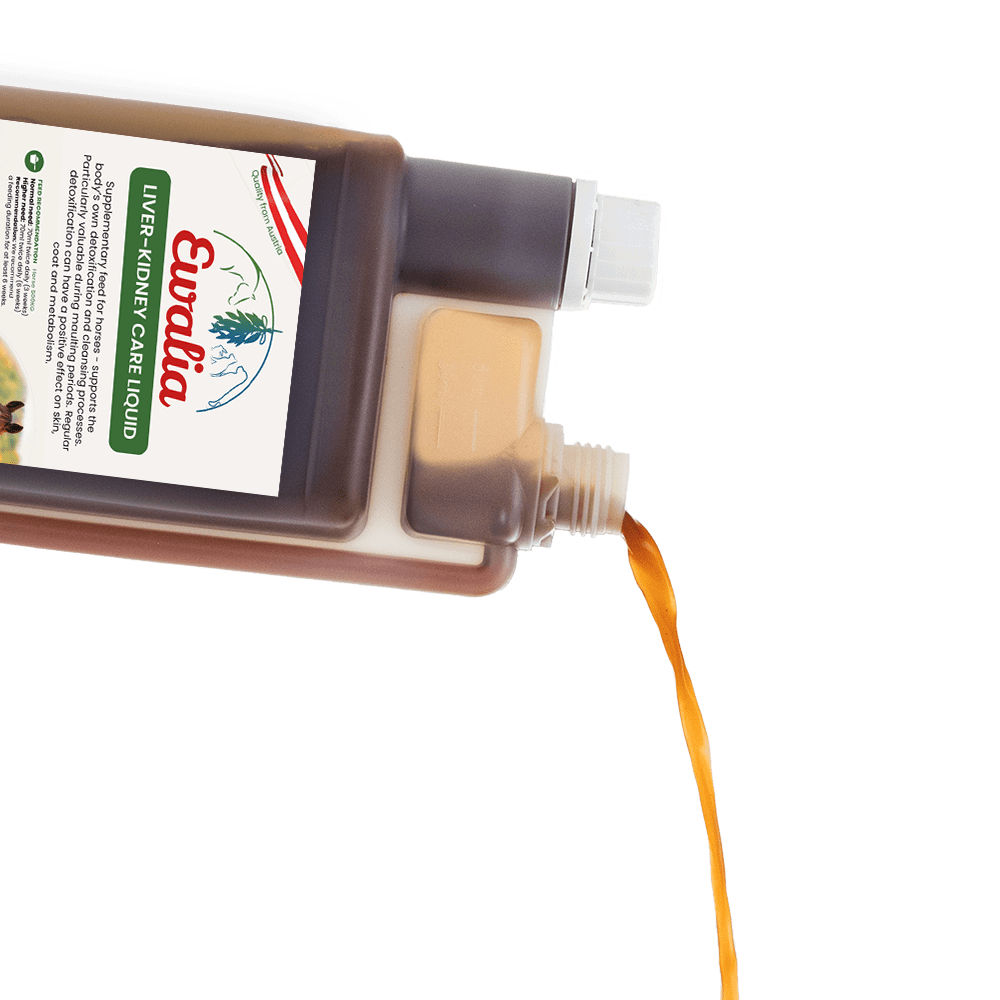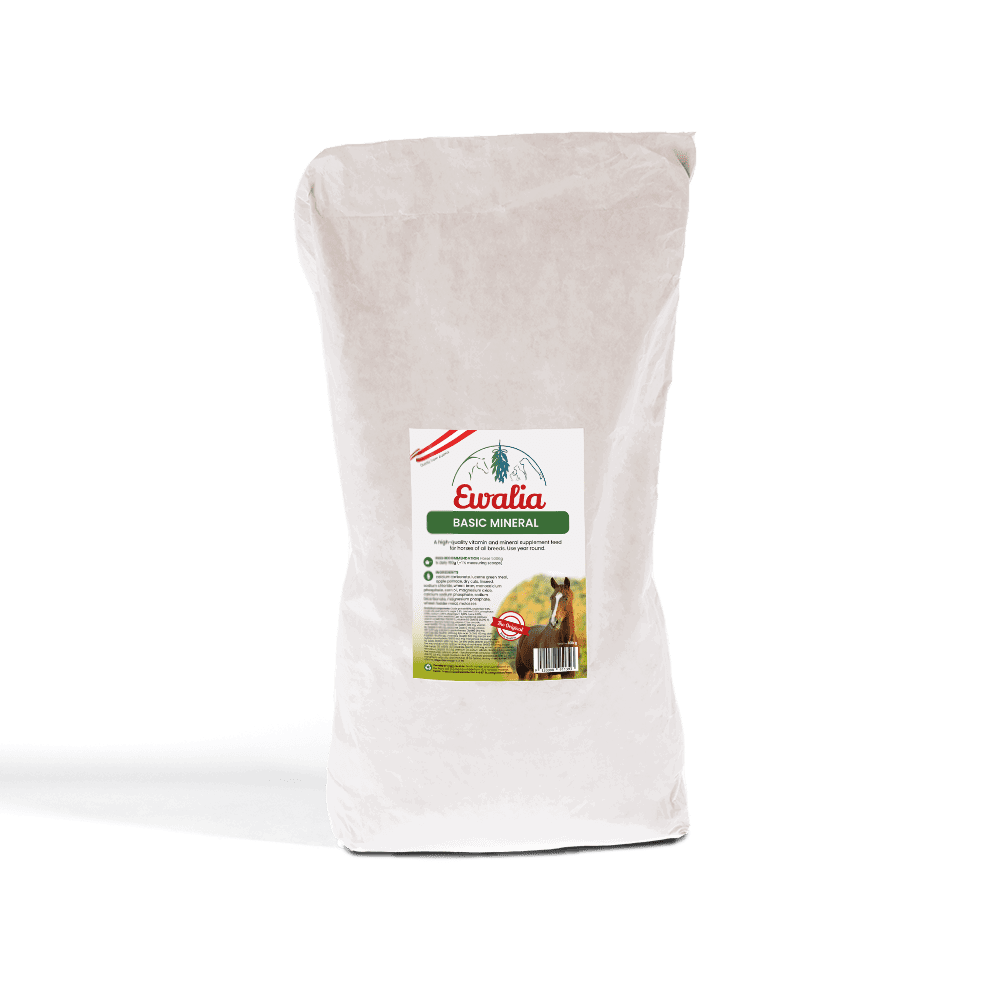KPU – a controversial metabolic disorder

The equine organism must deal with a large number of harmful substances. An excess of cereals and sugary feeds, strain from moulds and environmental toxins put high demands on the horse's detoxification organs. Long-term overload on the liver, kidneys and gut increases the risk of metabolic disorders. One of these disorders is kryptopyrroluria (KPU), a detoxification disorder that involves a wide range of symptoms. Learn which of your horse's symptoms indicate KPU and how to best help your horse here.
What is KPU?
Kryptopyrroluria (KPU) or haemopyrollactamuria (HPU) is a disorder of the detoxification system that involves a loss of nutrients. This metabolic disorder causes the horse to eliminate so-called kryptopyrroles with its urine.
When these kryptopyrroles are eliminated, they take trace elements and vitamin B6 with them, leading to deficiencies. This weakens the entire organism and makes the horse susceptible to secondary diseases.
Is KPU a real disease?
KPU is a topic of controversy in veterinary medicine. Its clinical picture is not recognised in traditional medicine as there have been no scientific studies on it to date.
Without a doubt, however, some well-nourished horses show symptoms that may be attributed to trace element and vitamin B6 deficiencies, which can have severe effects. Whether these are diagnosed as KPU or not, the causes should be investigated regardless!
The theory of a genetic predisposition for KPU in horses has been rejected. Kryptopyrroluria is seen today as a metabolic disorder that is curable with proper treatment and changes to feed and stabling.
What are kryptopyrroles?
Kryptopyrroles are a variant of pyrroles – the building blocks of haemoglobin and degradation products of protein metabolism. Pyrroles are harmful in large numbers but do not pose any threat to a healthy equine organism in small quantities: pollutants and toxins (poisonous substances) are broken down in the bile and excreted with the faeces.
This process involves certain enzymes and P5P (pyridoxal5-phosphate), a precursor of Vitamin B6, which is produced in the horse's gut. An insufficient amount of activated vitamin B6 will bring the metabolism out of balance, with fats, carbohydrates and proteins no longer being properly converted. P5P also supports the liver in detoxification processes. A healthy gut microbiome is necessary for the breakdown, binding, and removal of harmful substances.
Disturbances to the gut microbiotica and enzyme activity and the associated lack of active P5P cause the organism to have a higher concentration of pyrroles. Differently structured pyrrole molecules are formed – kryptopyrroles ("hidden" pyrroles) which cannot be broken down in the same way as pyrroles. In this case, metabolism occurs via a work-around. In the liver, harmful degradation products are bound to trace elements – mainly zinc, selenium, sulphur and manganese – for excretion via the kidneys.
Afflicted horses show increased kryptopyrrole levels in the urine as well as a deficiency of those trace elements which are flushed out with the urine.
Trace element deficiency: what are the consequences?
Many metabolic processes involve trace elements. In the medium to long term, a deficiency can lead to symptoms that can plague a horse.
A zinc deficiency weakens the immune system. The horse will be more susceptible to infections and allergic reactions, for example sweet itch.
A selenium deficiency is expressed in fatigue and decreased performance, stiff muscles, and in some horses loss of hair.
A sulphur deficiency is a common cause for skin, hair, and hoof problems, but can also lead to respiratory problems such as irritable cough.
Important: A sulphur deficiency is not determined by a blood count!
A manganese deficiency is rare, as manganese is plentiful in forage.
What symptoms suggest KPU?
KPU affects the horse's entire organism, with a wide range of symptoms that often require treatment independent of the clinical picture of KPU.
The following symptoms and signs suggest KPU:
- Warning signs of liver and kidney overload
- Skin problems like sweet itch or mud fever
- Hoof problems like thrush, poor horn quality, or white line disease
- Digestive disorders like colic, watery stool, and diarrhoea
- Musculoskeletal problems such as unexplained lameness, muscle strains, susceptibility to tendon and ligament injuries, exostoses
- Neurological clinical pictures like ataxia or shivers
- Metabolic disorders like EMS, Cushing's disease, insulin resistance, and susceptibility to laminitis
- Respiratory diseases like COPD or chronic cough ("hay dust allergy")
- Weakened immune system manifested in allergies, drug intolerance and susceptibility to infection.
How is KPU diagnosed?
Urine testing: A KPU test can determine the kryptopyrrole levels in a horse's urine sample. Levels above a certain threshold suggest that the horse suffers from KPU. The longer the disease has been present, the higher the level.
Tip: With a little patience, horse owners can collect urine samples themselves simply by waiting until the horse urinates! Very few laboratories offer KPU testing!
However, kryptopyrrole levels alone are not conclusive, as these can vary from horse to horse as well as change with the seasons. Kryptopyrrole levels should always be viewed in relation to the horse's indican levels.
Indican is a marker for a dysbiosis (bacterial imbalance) in the gut and can be measured in the urine. An indican level of 0 is optimum, while a level of 4 indicates a severe disruption to the gut flora, faulty fermentation, and decay.
Blood count
A full blood count will also indicate whether a horse has KPU. The parameters do not all have to be significant. Low levels of zinc and selenium as well as elevated liver values also point to KPU.
Important: One week before taking a urine or blood sample, stop feeding supplements that contain vitamin B6 or zinc so as not to distort the values!
What causes detoxification disorders?
Obesity, faulty diet, an excess of easily digestible carbohydrates, environmental stressors like fungi, etc., lack of exercise, stress, and pains can overtax the organism's natural regulation mechanisms. These can cause EMS and PSSM, as well as KPU.
Feeding
Our horses' feeds frequently contain too much sugar. It's not only in concentrates that sugar improves palatability; sugar levels in hay have also risen in recent years. This is due to the rise in high-sugar, high-performance grasses that horses like to eat. Too much sugar in the ration will put strain on the metabolism!
Haylage and silage are produced through lactic acid fermentation. Large quantities of lactic acid bacteria lead to imbalances in the bacterial colonisation of the digestive tract and change the composition of the gut flora. This endangers the P5P-forming microorganisms in the gut, meaning that sufficient quantities of P5P or activated vitamin B6 can no longer be produced.
Environmental pollutants
Moulds, insecticides, solvents in wood preservatives, and suboptimal stable hygiene can make conditions favourable for the development of KPU symptoms.
Stress
Conflicts within the herd, a change of yard, turnout on a new summer pasture: all these can mean prolonged stress for the horse. Prolonged stress puts strain on the organism and can lead to a metabolic imbalance.
Important: Some horses try to lower stress levels through constant eating – chewing is calming! It is recommended that constant eaters be fed lean hay and that their weight be checked regularly!
How can KPU be treated?
In the short term, treatment is based on the symptoms of individual afflicted horses. When considering treatment, KPU should be included as a possible cause!
With KPU, improvements to the horse's stabling conditions and diet take top priority for a sustainable improvement or cure. Because the cause of KPU involves a disturbance of the gut flora, the aim of treatment must be to assist in the development of a healthy gut microbiome. KPU can be cured through appropriate changes to the horse's diet and stable conditions as well as supportive treatment.
Caution when administering medications!
With KPU horses, the effects of medications that are administered through the feed or given orally can be different than expected. Through inhibited degradation, medications can have longer or weaker effects, in some cases none at all. Other horses may experience severe side effects from even low doses.
Tip: Always consult with your vet before giving your horse medication!
What are important factors in the stabling of a horse with KPU?
- The horse's environment should be as clean as possible to keep strain off the organism. Regular mucking out of stalls and adequate fresh air will increase a horse's well-being!
- Tip: Spraying the stable floor and bedding with effective microorganisms can improve the environment in the stable.
- Avoid use of chemical pollutants in the environment: Insecticide sprays, strong chemicals against mite infestation, etc., can worsen the horse's condition. Always check the ingredients in wood preservatives and cleaning solutions!
- Stable, feed, and bedding must be regularly monitored for mould infestations, as horses with KPU can have strong reactions to moulds.
How should a horse with KPU be fed?
To promote healthy gut flora, the ration should be based on a good-quality, dust-free, lean hay from the first cutting. If a horse needs to be fed concentrates, it should only be given products that contain no molasses or sugar to keep strain off the metabolism.
Tip: You can replace sugary treats with dried rose hips. Most horses love the taste! Rose hips also contain lots of vitamin C and keep the immune system strong!
Do not feed the horse foods that are high in pectin, like carrots and apples, until the gut flora has stabilised. This may take up to two years!
Important: Do not feed the horse silage or haylage! Also avoid brewer's yeast!
Will added vitamins, minerals, and trace elements help a horse with KPU?
A high-quality mineral feed can provide the horse with the important micro-nutrients that it lacks.
However, a word of caution: A mineral feed is not enough on its own, but should be part of a comprehensive KPU treatment. Regular feed supplements may raise zinc and selenium values in the blood, but these will soon drop again when the supplements are discontinued.
A successful response to treatment may not be seen until after several months or a year.
It might be KPU: how can I support my horse?
Supplementing your horse's feed with herbs can help bring balance to the gut flora:
- Marsh-mallow will sooth an irritated intestinal epithelium and promotes regeneration.
- Oak bark has astringent and anti-inflammatory properties.
- Raspberry leaves are rich in vitamins and minerals and have a relaxing effect on the muscles.
- Yarrow contains bitter substances which stimulate the production of bile and support detoxification.
Some vets recommend liquorice tea, which is anti-inflammatory and protects the mucous membranes.
Spirulina algae supports detoxification of the organism and can be fed to the horse for about six weeks.
Tip: Some horses will view algae with scepticism. Start with small amounts and increase slowly!
Herbs like nettle, dandelion, goldenrod, and birch support kidney function.
Important: Milk thistle preparations to support liver function are not advised in cases of KPU. The substance silymarin can worsen symptoms substantially. Also avoid feeding your horse artichoke to stimulate the liver!
Quellen
- Christina Fritz, Pferde fit füttern, 6. Aufl., München 2020
- Christina Fritz, Souel Maleh: Zivilisationskrankheiten des Pferdes. Ganzheitliche Behandlung chronischer Krankheiten, Thieme, Stuttgart/New York 2. Aufl. 2016
- Patricia Wanas: KPU (Kryptopyrrolurie)
- DR. MED.VET. ANDREA WÜSTENHAGEN: FÜTTERUNG UND MANAGEMENT BEI STOFFWECHSELERKRANKUNGEN BEIM PFERD – BERICHT AUS DEM PRAXISALLTAG
















